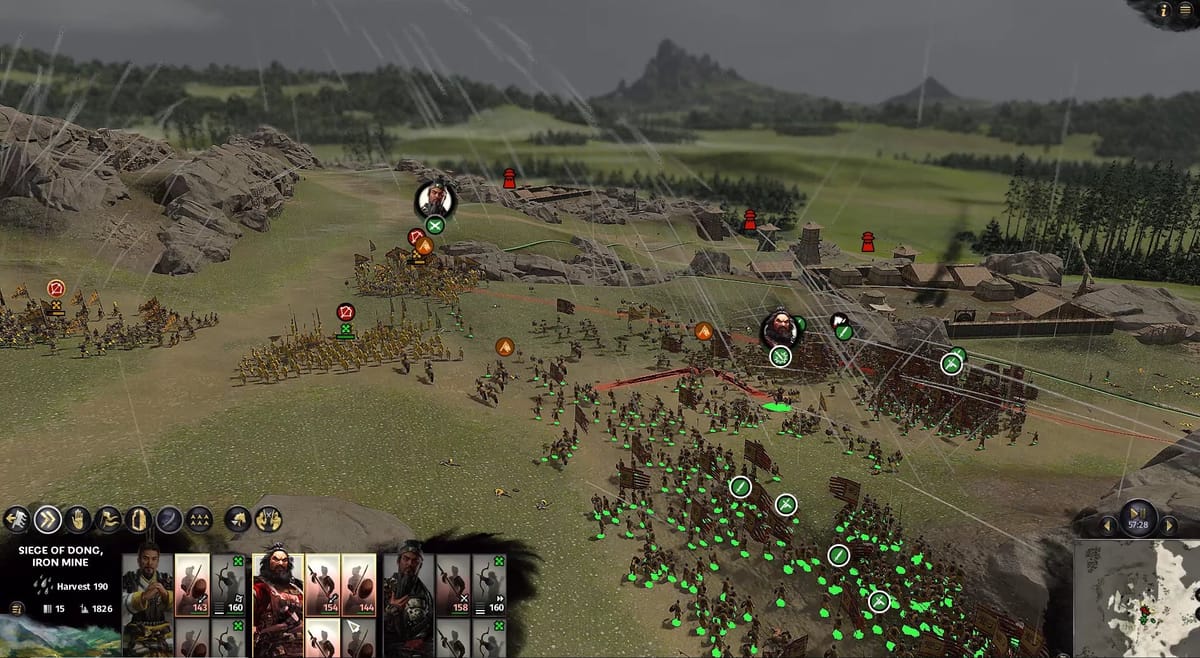
The Total War series has taken the gaming community by storm as it has covered many fantastical time periods like the battles of Napoleon, clashes in Rome, and much more. Soon it will be time to head into the Three Kingdoms period of China’s history with the newest installment coming out in March.
Last time I got the opportunity to play Total War: Three Kingdoms, I was limited to one specific battle, albeit it a pretty great one. This time I was given the chance to delve into more of the story, specifically Liu Bei’s story. Upon starting his story, you have little land occupied, but have a strong army to work with. This makes it easier to branch out and expand without much worry, but you should still be careful. You still have limited soldiers and resources to work with, so keep that in mind.
Liu Bei has a mechanic called “unity” that allows him to gain swifter prestige and faction progression. He can also attempt to annex Han territory, which is a non-violent method to obtain more land with having to fight a battle. This isn’t always successful, but when it works out, you’ll be glad that you saved the lives of some of your soldiers. Liu Bei is a charismatic man of the people, and that enables him to more effectively expand his empire through diplomatic means in lieu of constant violence. You can still fight whenever you want, but it may be better to stick with his strong points.

Total War: Three Kingdoms has one main goal: become emperor and unify China. To do this, you’ll need to rise through the ranks as you spread your influence, control more land, and gain more support from the people. There are plenty of features that come into play as you work towards this goal, including factions, Guanxi, Wu Xing, diplomacy, province management, and more. When playing the game, you’ll have eleven warlords to choose from.
One big aspect of the game is that characters are faction agnostic, meaning that they aren’t loyal to factions and may switch factions depending on the events of the game. In other words, your choices matter more than just deciding what settlement to attack or what upgrades to build. For example, if you have a general that prefers diplomacy over bloodshed, they may be tempted to leave you if you constantly go on rampages, killing everyone in your way. Characters are designed to feel more real in that they can make their own choices to a degree. This even extends to Guanxi, which represents the relationships between the characters. As mentioned in my last piece, if characters have a strong enough bond, the death of one person may cause their friend or relative to fly into a rage and attack. It’s amazing to witness an emotional event like that from the AI.
Another new feature is Wu Xing, otherwise known as the five elemental phases. These operate in a sort of rock-paper-scissors type of format during battles. The different classes, traits, and skills all fall under this umbrella, and can affect the flow of battle. Each group has their own advantages and disadvantages against the others, so you’ll want to study this chart and plan accordingly when heading into battle. If you learn the best ways to strike your opponents, then you’ll be better off in the long run.

In addition to battles, diplomacy and province management are incredibly important to attend to. Diplomacy includes trading resources, forming coalitions or alliances, and more. You can click on other settlements and towns in order to negotiate with them whenever you want. This brings up a menu where you can choose what you want from them and what you will give in return. Options include money, food, ancillaries, allowing one another into their territory, peace treaties, and more. Other factions may also prompt you for negotiations on their own, which you can choose to accept, adjust, or decline. While deciding the terms of the deal, it will show you how the other party feels about the current suggestions. They may be happy with it and agree, or they may outright refuse your outrageous requests. My personal favorite was seeing the word “NEVER!” appear where you would usually accept the deal. It’s clear that you can ask for way too much.
Province management is important as well because it is what keeps your growing empire healthy, strong, and able to expand without falling apart. You’ll need to get more land to house your citizens, produce enough food to feed them, keep your army supplied, and generally keep your people satisfied. For example, your supplies dwindle while in enemy territory, but will resupply when stationed somewhere that you control. This means you’ll need to think carefully and make wise decisions when making your moves. Do you spend this turn building upon your farming settlements or do you focus on upgrading the merchant’s store? Do you venture out to attack a neighboring city or do you wait an extra turn to resupply in one of your towns? You need some more supplies but a new city could help you thrive more. In the end, you’ll have to plan carefully.

All in all, my time with Total War: Three Kingdoms was fantastic. There are a lot of complex systems and features that come into play during the game, which can be a lot to handle, especially for players not familiar with the series. Veterans of the series are sure to enjoy the game, while newcomers looking for a challenge and some intricate planning may get their fill as well. I’m interested to see what else there is to offer once the full game comes out, but it looks like a lot of research, effort, and passion was put into this project. Total War: Three Kingdoms is set to release March 7th on PC, Linux, and Mac.
